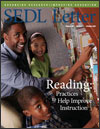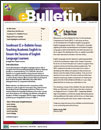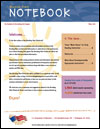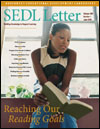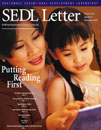SEDL's Free Magazines/Newsletters for Reading and Literacy
Reading and Literacy
Magazines/Newsletters
Southeast Comprehensive Center eBulletin, Volume 5, Number 1: Strengthening Literacy Programs and Instruction (2010)
This issue of the Southeast Comprehensive Center eBulletin focuses on literacy, specifically on how states can strengthen their literacy programs or plans and provide effective professional development and technical assistance for high-need districts in their efforts to implement quality literacy instruction.
This issue of the Southeast Comprehensive Center eBulletin focuses on literacy, specifically on how states can strengthen their literacy programs or plans and provide effective professional development and technical assistance for high-need districts in their efforts to implement quality literacy instruction.
Sub-category: Early Reading
SEDL Letter, Volume XIX, Number 2 (Oct. 2007): Reading: Practices to Help Improve Instruction (2007)
This issue of SEDL Letter examines ways to strengthen literacy through father-child interactions and systemic approaches, including Response to Intervention and school improvement.
This issue of SEDL Letter examines ways to strengthen literacy through father-child interactions and systemic approaches, including Response to Intervention and school improvement.
Southeast Comprehensive Center eBulletin, Volume 2, Number 1: Teaching Academic English to Ensure the Success of English Language Learners (2007)
This issue of eBulletin, published quarterly, focuses on strategies for helping English language learners (ELLs) develop academic English.
This issue of eBulletin, published quarterly, focuses on strategies for helping English language learners (ELLs) develop academic English.
Reading First Notebook: The Newsletter for the Reading First Program (2005)
The Reading First Notebook was published on a quarterly basis from 2004 to 2006, and is now available online for download in pdf format. The newsletter provided thematic issues covering topics such as assessment, professional development, and instruction for special population students.
The Reading First Notebook was published on a quarterly basis from 2004 to 2006, and is now available online for download in pdf format. The newsletter provided thematic issues covering topics such as assessment, professional development, and instruction for special population students.
SEDL Letter, Volume XVII, Number 1: Reaching Our Reading Goals (2005)
This issue of SEDL Letter is devoted to topics related to reading instruction, including the role of literacy coaches, how to motivate readers, and instruction to improve comprehension.
This issue of SEDL Letter is devoted to topics related to reading instruction, including the role of literacy coaches, how to motivate readers, and instruction to improve comprehension.
SEDL Letter, Volume XIV, Number 3 (Dec. 2002): Putting Reading First (2002)
This issue of SEDL Letter focuses on early reading instruction and assessment, including topics such as reading and migrant students and the importance of phonemic awareness.
This issue of SEDL Letter focuses on early reading instruction and assessment, including topics such as reading and migrant students and the importance of phonemic awareness.


